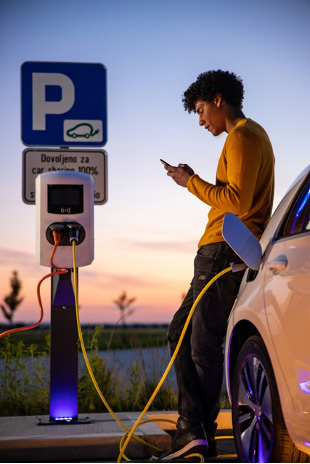As electric vehicles rise in popularity, creating the necessary charging infrastructure poses serious challenges.
Customers are purchasing electric vehicles (EVs) at exponential rates. The U.S. government has set a goal for half of all vehicles sold to be electric by 2030. To accommodate for this growth, McKinsey Research calculates the U.S. will need 1.2 million public and 28 million private EV chargers by 2030—approximately 20 times more than there currently are. Producing that number of chargers in the next seven years, to put it lightly, will not be easy.
Achieving mass adoption of EVs poses several challenges. The U.S. will need to increase battery production dramatically. Supply chain disruptions for EV batteries have plagued the industry and filled the news. Meanwhile, charger supply chains, by comparison, have flown under the radar. But for those involved in the industry, opportunity is surrounded on all sides by challenges. As manufacturers work at full tilt to produce enough chargers to keep up with demand, holes in the supply chain— specifically around sales, installation, and maintenance—are emerging. Filling that gap is an innovative, emerging category of companies: EV charging consultants.
If EV charger manufacturers intend to keep up with demand, they’ll need to invest all their time into their core competency: making chargers. Already, few manufacturers can keep up with inbound sales volume. And it’s only going to get worse. To meet rising demand, manufacturers will need to rely on third-party resellers to act as go-betweens with customers, handling education, sales, and more.
The following are a few key ways that EV consultants help bridge the gap between EV charger manufacturers and customers:
Developing a robust EV charging infrastructure requires private businesses to adopt EV charging. While many may be interested, few have in-house knowledge of the ins and outs of EV charging. This lack of in-house knowledge causes them to delay or avoid implementation altogether. Overcoming this knowledge gap will require large-scale and small-scale education, which manufacturers don’t have time for with the current production demand.
EV charging consultants are helping businesses overcome the knowledge gap by walking them through the EV charging adoption journey. Here are some common questions that EV charging consultants help their clients through:
It’s common to hear bold statements about EVs being the future. It’s less common to hear people ask, “So, who’s going to install all those chargers and maintain them?” Answers are almost unheard of.
Because the industry is so new, few electrical contractors have experience installing EV chargers. Installing EV chargers often requires upgrading electrical grid capacity at a site, handling high-voltage wiring, and establishing IT connectivity for chargers. Recognizing another critical gap in the EV charger supply chain, some EV consultants have added installation to their portfolio of services. In fact, that’s how I entered the industry. After 30 years in electrical contracting, including five years as a founder and CEO of Critical Peake Electrical Services, I entered the EV charging industry to meet the pressing need for technical expertise.

An added bonus of finding an EV consultant that can handle installation is the opportunity for ongoing maintenance services. Recalling that manufacturers are operating at, or beyond, full capacity, maintenance services stretch them even thinner and threaten to slow the supply chain further. And charger maintenance is a serious concern. A recent study in California found that 25% of the state’s chargers were down, mostly due to IT connectivity issues. An end-to-end EV charging consultant will be able to solve many of these IT connectivity issues remotely, often before the facility even realizes there’s a problem.
Consumers and government leaders alike are calling for a more sustainable future for the auto industry. And EVs are the path forward. But turning these dreams into a reality will require innovation and cooperation throughout the supply chain—where one sector of the industry struggles, others will have to stand in the gaps.
Together, with manufacturers creating what only they can create, and with consultants connecting with customer needs, manufacturers and consultants can streamline the supply chain of EV chargers, allowing the coming mass of EV drivers to charge wherever and whenever they need.

About the Author:
Rich McNulty is the CEO of Blue Whale EV, an advisory and service organization to the EV charging community. He and his company help commercial and government clients through the entire EV charging adoption journey – from education to sales, installation, and ongoing maintenance. Rich comes to the EV charging industry after more than 30 years in the electrical contracting industry. In 2017, he founded Critical Peake Services, a licensed Commercial Electrical Contractor, and has served as its CEO since 2017.
Blue Whale EV | www.bluewhaleev.com
Scott Ellyson, CEO of East West Manufacturing, brings decades of global manufacturing and supply chain leadership to the conversation. In this episode, he shares practical insights on scaling operations, navigating complexity, and building resilient manufacturing networks in an increasingly connected world.